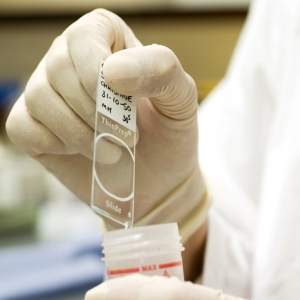

MedFriendly®


Cytology
Cytology is an area of biology that deals with the
study of the structure, function, multiplication, life
history, problems, diseases, and chemistry of the cell.
A cell is the smallest, most basic unit of life, that is
capable of existing by itself. In cytology, the cells are
studied under a microscope. Typically, cytology is
used to assess for cancer or pre-cancerous changes.
Cancer is any of a large group of malignant diseases
characterized by an abnormal, uncontrolled growth of
new cells in one of the body organs or tissues.
FEATURED BOOK: Molecular Biology of the Cell
Cytology testing in the lab.
The most common cytological evaluation is a Pap smear. A Pap smear is a type of test
used to detect abnormal changes in cells in the cervix. The cervix is a small, cylinder-
shaped organ that forms the lower part and neck of the uterus. The uterus is a hollow
organ in a female's body where the egg is implanted and the fetus develops.
Cytology is sometimes referred to as cellular biology and cytobiology. However, when
these terms are used, it refers to the study of normal cell structure, function, and
chemistry. Cytopathology, on the other hand, is a more specific term that refers to the
study of diseased cells and changes of cells to help diagnoses disease. Someone who
studies cytology is known as a cytologist. Cytologic means pertaining to cytology.
Cytology comes from the Greek word "kytos" meaning "a hollow (empty) cell," and the
Greek word "logos" meaning "study." Put the two words together and you have "study (of)
hollow cell(s)."
"Where Medical Information is Easy to Understand"™
















